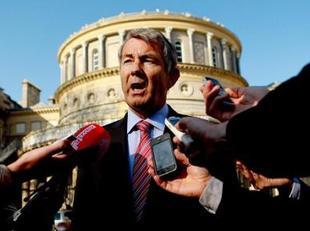Don't slam the Moriarty report until you read it

Denis O'Brien was on a beach in Mayo when he heard of the findings of the Moriarty Tribunal. Michael Lowry was near a beach in the south of Spain when he heard of the findings, writes Vincent Browne.
Lowry decided to stay away for a day to get his thoughts together.
O'Brien waded in immediately, having surely only time to read mere snatches of the gigantic report. Both made matters worse for themselves.
The decision to take on Michael Moriarty, the sole member of the tribunal and author of the report, was mistaken.
What possible motivation could Moriarty have in smearing the reputations of O'Brien and Lowry without reason and evidence?
The claim that he suffered from ''Stockholm syndrome'' - the psychological phenomenon whereby captives assume the character and motivation of their captors - is just plain silly, for it takes no account of the robust independence of Michael Moriarty, and goes on to imply that he was the captive of one of the tribunal lawyers, Jerry Healy.
It's claimed that Healy was, in turn, a captive of the Persona consortium, which competed against O'Brien's Esat Digifone for that second mobile phone licence in 1995.
Never have O'Brien or Lowry acknowledged that their own legal teams explicitly approved of the appointment of Healy as tribunal counsel on the phone licence module, knowing of his previous minimal involvement with Persona.
The further claim that the judges of the High Court and Supreme Court were captives of Moriarty - forming a judicial ring of steel around him, impervious to the legitimacy of challenges to Moriarty's rulings - was almost hysterical.
The reality is that both courts have found against the tribunals on several occasions, most recently in the case taken by Joseph Murphy Jr against the planning tribunal on the issue of costs.
The Supreme Court's decision on that could result in the state being hit with hundreds of millions of euros in tribunal legal costs.
So much for the courts being the captives of the judges on the tribunals.
O'Brien and Lowry claimed Moriarty's findings were based on no evidence or facts at all, implying they were dreamt up by Moriarty out of the ether.
Both made such claims without reading the report and seeing the forensic reasoning supporting the findings. (Some of their journalistic fans did likewise.) Neither opted to defer judgment until they had read the report in full - this probably would take most of us a week.
But they have been able to go on the airwaves to be interviewed by presenters who have not read the report either and who have therefore not been in a position to challenge the claims that the reports are based on flimsy evidence, or no evidence at all.
To that extent, O'Brien and Lowry have had a free run on the airwaves, for now. But that free run appears to have convinced few people, if the text and tweet reactions to these interviews is a gauge.
They may also benefit from the scheduling of the Dáil debate on the report for Tuesday and Wednesday, because TDs, and ministers, will not have had an opportunity to examine the report fully by then either.
They are unfortunate, however, that the report is published at a time of public outrage over public officials who have done such damage to the country, and a general perception of pervasive corruption.
For that public outrage will demand consequences, and the Labour Party in government will be pushed into ensuring that there are consequences.
Already the report has been forwarded for consideration to the DPP and the Garda. The question of restrictions on media ownership will also be raised again.
Even aside from the Tribunal, questions arise about the control of the media by people with extensive non-media interests, whose corporate conduct generally remains a legitimate focus of media attention.
This, of course, arose in the case of Tony O'Reilly, who had a controlling stake, not just in Independent News and Media (INM), publishers of the Irish Independent, Sunday Independent and scores of other newspapers, but also in Eircom, Waterford Glass, mining and a vast range of non-media interests.
To what extent, were the major issues arising from O'Reilly's business interests reported in Independent Newspapers?
Similarly, aside from anything to do with the Moriarty Tribunal, is it acceptable that someone like O'Brien, with such extensive corporate interests and power, should also be permitted to control such a broad swathe of the media that ought to be holding him to account?
This story will run and run.
